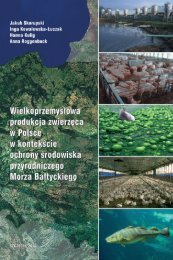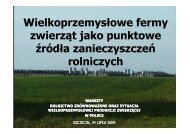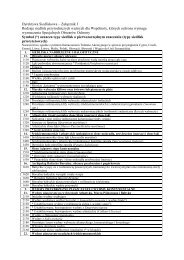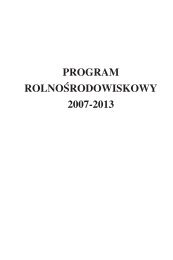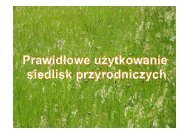best available technologies for manure treatment - Baltic Green Belt
best available technologies for manure treatment - Baltic Green Belt
best available technologies for manure treatment - Baltic Green Belt
Create successful ePaper yourself
Turn your PDF publications into a flip-book with our unique Google optimized e-Paper software.
Best Available Technologies <strong>for</strong> <strong>manure</strong> <strong>treatment</strong> baltic sea 2020<br />
1: INTRODUCTION AND BACKGROUND DESCRIPTION<br />
Biogas Branch Association. It is planned to publish<br />
a version ultimo 2009, and a ‘final’ version October<br />
2010.<br />
1.5.3: balticCOMPASS<br />
balticCOMPASS is a new<br />
project with a budget of<br />
M€ 6.5 that recently was<br />
approved <strong>for</strong> financing by<br />
the EU <strong>Baltic</strong> Sea Region<br />
Programme 2007–2013<br />
/ Interreg IIIB. The project is led by Swedish Agricultural<br />
University and has some 25 partners in the<br />
countries around the <strong>Baltic</strong> Sea. The overall objective<br />
is defined as “To contribute to securing a good ecological<br />
status of the <strong>Baltic</strong> Sea as a means to contribute<br />
to economic growth and integration in the <strong>Baltic</strong> Sea<br />
Region”, and livestock <strong>manure</strong> <strong>treatment</strong> <strong>technologies</strong><br />
are a key focus of the project. The project includes<br />
the following six work packages (work package<br />
leaders in brackets):<br />
i. Management and Administration (SLU)<br />
ii. Communication and in<strong>for</strong>mation (BSAG)<br />
iii. Best Practice - utilisation and transfer (JTI)<br />
iv. Investment preparation (ABP/CBMI)<br />
v. Comprehensive assessment and scenarios (SYKE)<br />
vi. Governance and policy adaptation (SEI)<br />
The work packages contains measures to reach the<br />
overall objective, here under in<strong>for</strong>mation and dissemination<br />
measures, development on utilisation<br />
and transfer of <strong>best</strong> practices, support to speed up<br />
investments in the <strong>best</strong> <strong>manure</strong> <strong>treatment</strong> <strong>technologies</strong>,<br />
monitoring and modelling measures, and policy<br />
adaptation. The project will run <strong>for</strong> 4 years.<br />
1.5.4: Forum <strong>for</strong> Inventive and Sustainable<br />
Manure Processing, a <strong>Baltic</strong> Sea Strategy<br />
Flagship Project<br />
There is a long term need to co-ordinate basic and<br />
applied research, model development, develop and<br />
discuss scenarios, transfer of knowledge, and business<br />
innovation and development initiatives within the<br />
field of Sustainable Manure Processing.<br />
The <strong>Baltic</strong> Forum <strong>for</strong> Inventive and Sustainable<br />
Manure Processing will contribute to rural development<br />
by rein<strong>for</strong>cing sustainability of agriculture<br />
in the <strong>Baltic</strong> region. This will be done through an<br />
improved exchange of in<strong>for</strong>mation on how to process<br />
<strong>manure</strong> (pig, cattle, poultry) in sustainable ways in<br />
the <strong>Baltic</strong> Sea Region to minimize the environmental<br />
impact, and to reach benefits such as renewable<br />
energy, job creation and business development.<br />
The <strong>for</strong>um considers <strong>manure</strong> a serious problem,<br />
but also a part of the solution. Manure should<br />
become an attractive and profitable resource in the<br />
future. Processing <strong>manure</strong> can and should lead to<br />
production of ‘designer fertilisers’ (pellets, liquid,<br />
etc.) improving agricultural production and bio-energy<br />
(biogas, fibre combustion, etc.) reducing the CO2<br />
emissions in the region.<br />
The Forum is included as a ‘Fast track Flagship<br />
project’ (i.e. highly prioritised) in the EU <strong>Baltic</strong><br />
Sea Action Plan. CBMI (Denmark) and Agrifood<br />
Research, MTT (Finland) are nominated as lead<br />
partners.<br />
The process of project establishment is ongoing<br />
and specific objectives of the project are to be defined.<br />
So far there has been held consultations between<br />
the key actors; MTT and CBMI as well as a contact<br />
committee under the Danish Ministry of Foreign<br />
Affairs, and a coordination meeting organised by the<br />
Finnish Ministry of Agriculture.<br />
1.5.5: <strong>Baltic</strong> DEAL – Putting Best Practices in<br />
agriculture into work, a <strong>Baltic</strong> Sea Strategy<br />
Flagship Project<br />
The overall aim of <strong>Baltic</strong> DEAL is to improve the<br />
environmental status of the <strong>Baltic</strong> Sea through<br />
reductions in nutrient losses from the agricultural<br />
sector without impairing competitiveness or production.<br />
The project aims to create a sector-driven and<br />
voluntary approach to raise awareness and increase<br />
expertise among farmers in order to reduce negative<br />
environmental impact while at the same time maintaining<br />
or increasing competitiveness, thus creating a<br />
win-win situation.<br />
The specific objective of the project is to develop<br />
a nationally adapted, yet common, <strong>Baltic</strong> Sea region<br />
approach to advance and strengthen agricultural<br />
advisory services and related demonstration and<br />
18




